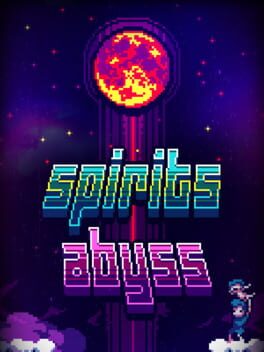It's weird that there aren't dozens of games riffing on Spelunky, right? The formula Derek Yu came up with is, rightfully, lauded as a perfectly designed system space, allowing interactions of every level of play between implementations of progress, regress, and a careful lack of excess to empower a feeling of eternally broadening boundaries similar to the player expression of Deus Ex or the narrative/world dimensions of Planescape. Spelunky considers a 'weight' of asset placement, from enemies to architecture to items, which informs not only the Spelunky game world but also an archetypal insinuation to the metaphysical propriety that player interactions, and player interception, have with a locale between starting state and end state.
And so, with such a broad and iterable style of 'speech' Spelunky styles for itself (it may as well have a chapter to itself in Ulysses), I am kind of amazed that there's like this and... Steamworld Dig? Maybe, charitably, Noita? Honestly, maybe there are more (although the games which are tempting to consider as Spelunky inspired inevitably make combat the necessary precondition to success, so they become more Castlevania-likes except without the considered world design, eschewing environmental storytelling and worldbuilding for copy and pasted blocks lining an arena locale, often times completely zoomed out to the complete loaded area, rendereing expressive traversal moot by forcing paper maze pathing) but given that we tout such that Spelunky and Isaac inspired most of the 2010s Roguelike class, it's weird that most games of that type follow Isaac and not the superior Spelunky.
Spirits Abyss, then, pays the due bill for the stepping stones Derek Yu lined up, manufacturing a thematically related game to Yu's with a parallax skyline of interceding qualities from both the dissimilarity of its genre conventions as well as executing on its spatial transgressions in a way totally unlike Spelunky. The light horror theme works brilliantly for a visual palate; nicely subverted with a cuteness and whimsy, another homage to Spelunky, that sweetens the terrifying implications while effecting a greater strangeness and perversion than if played overtly horrible. The mechanical lean towards a more allowably aggressive verb set does change the play space for actionable habitation, but it also heightens the sense that the player is not supposed to be within this world, that they are being haunted and hunted in a way that Spelunky's defensive and avoidant play does not suggest at. The aggressive verb set, of course, also changes the second to second play, making structurally similar passages in the procedural layout of Spelunky feel more claustrophobic or empowering in Spirits Abyss with its differently designed play conditions surrounding the avatar. The reward structure hints at a greater and wilder form relating to the player's motivations than Spelunky's, maybe the only, in my opinion, directly vertical improvement the game makes over its ancestor. Spirits Abyss finds spaces in its world to be crueller, kinder, and queerer in a way Spelunky couldn't, knowing the antecendent it destined for itself.
It's a really fun, legitimately scary in its way, game that asserts good design is more than a good game, but a good blueprint for further design.
And so, with such a broad and iterable style of 'speech' Spelunky styles for itself (it may as well have a chapter to itself in Ulysses), I am kind of amazed that there's like this and... Steamworld Dig? Maybe, charitably, Noita? Honestly, maybe there are more (although the games which are tempting to consider as Spelunky inspired inevitably make combat the necessary precondition to success, so they become more Castlevania-likes except without the considered world design, eschewing environmental storytelling and worldbuilding for copy and pasted blocks lining an arena locale, often times completely zoomed out to the complete loaded area, rendereing expressive traversal moot by forcing paper maze pathing) but given that we tout such that Spelunky and Isaac inspired most of the 2010s Roguelike class, it's weird that most games of that type follow Isaac and not the superior Spelunky.
Spirits Abyss, then, pays the due bill for the stepping stones Derek Yu lined up, manufacturing a thematically related game to Yu's with a parallax skyline of interceding qualities from both the dissimilarity of its genre conventions as well as executing on its spatial transgressions in a way totally unlike Spelunky. The light horror theme works brilliantly for a visual palate; nicely subverted with a cuteness and whimsy, another homage to Spelunky, that sweetens the terrifying implications while effecting a greater strangeness and perversion than if played overtly horrible. The mechanical lean towards a more allowably aggressive verb set does change the play space for actionable habitation, but it also heightens the sense that the player is not supposed to be within this world, that they are being haunted and hunted in a way that Spelunky's defensive and avoidant play does not suggest at. The aggressive verb set, of course, also changes the second to second play, making structurally similar passages in the procedural layout of Spelunky feel more claustrophobic or empowering in Spirits Abyss with its differently designed play conditions surrounding the avatar. The reward structure hints at a greater and wilder form relating to the player's motivations than Spelunky's, maybe the only, in my opinion, directly vertical improvement the game makes over its ancestor. Spirits Abyss finds spaces in its world to be crueller, kinder, and queerer in a way Spelunky couldn't, knowing the antecendent it destined for itself.
It's a really fun, legitimately scary in its way, game that asserts good design is more than a good game, but a good blueprint for further design.

und
2 months ago